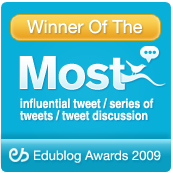Recently, the editors of Edutopia were considering a theme for their bloggers to blog about concerning testing. In order to keep things timely, they needed to find out when most schools were being affected by standardized tests. It was a reasonable consideration, worthy of a responsible examination of the subject. It was the question posed to the bloggers however, that set me off about our evolved approach to these standardized tests. When is your Testing Season?
Every standardized test has a date or two or three that it is to be administered, but the question was not what are the dates of the standardized tests in your school. The idea that any school would have a “testing season” is enough to drive an advocate for authentic learning to skip taking his scheduled life-saving medications in order to stay on task completing a post about this culture of testing that we have allowed to develop. Every state has its own schedule for tests and a list of grades to take them. New York was at one time considering testing from Pre-K to 2nd grade as well all as the other grades. How does anyone get behind testing toddlers? Testing as it stands now begins in New York at 3rd grade. Here is a site that outlines what each state requires for their Standardized testing. Standardized Testing State By State, Standardized Tests Are Here to Stay
The thing that has really gotten me bothered is this culture change in education. It is no longer about the learning, but rather it is all about the testing. We no longer view the test as an assessment tool of learning to adjust lessons to meet the needs of each student. It has become a means to manipulate data to affect factors beyond that of just student learning. Standardized tests are certainly not the best form of student learning assessment. That seems not to matter however since for whatever the reason, we have had to expand and elevate testing day, or days to The Testing Season.
I remember a conference that I attended a few years ago where a New York City teacher was complaining that his elementary school dedicated an entire month to nothing being taught except for test preparation. The principal of that school monitored the classes to make sure that this strategy was adhered to by one and all. The most recent change in the testing culture is the need to accommodate the tests with all available technology. Some standardized tests are to now being administered via computers. Many schools provide Internet access to their students and teachers solely through computer labs. The tests however, take precedence over learning during “Testing Season” requiring limiting or even shutting down access to these labs in order to prepare for, and administer these computer-delivered standardized tests.
I guess each season brings us feelings associated with it. From the season of summer we may feel invigorated with warmth and recreation associated with it. The season of winter brings on good feelings of sharing holidays, and hot-chocolate comfort. From the season of Testing we get stress and anxiety for kids and adults. I guess the season of Testing is not the season about which many poems are written.
Of course teachers will tell you that they are comfortable in setting their students at ease about the tests during “Testing Season”. I often told my students that I had every confidence that they would do very well on any standardized test that they took because their education prepared them for it. That of course was to reduce their stress and build their confidence, but I am glad I did not have a wooden nose. It would have been a dead giveaway.
Today’s teachers are very stress bound when it comes to these tests. The tests have become less of an assessment of student learning and more of a club or Thor’s hammer for teacher evaluation. Of course teachers are stressed and that is generated to the students for the duration of the “Testing Season”, whether or not the teacher intends for that to happen. If teachers could select students for their classes, crafty teachers would always opt for classes with the slower students. Those are the classes that can show the most advancement in “testing season”, making the teacher a shining star. A great teacher with an outstanding class is cursed and possibly deemed inadequate because kids performing at the very top of the scale will show little improvement. Of course, according to the assessments, it must be the teacher’s fault that kids in the 95th percentile did not move at least five points higher. How can there not be stress and anxiety in the “testing season”?
We may need to research any drop in attendance at schools with stress related illnesses during “testing season”. We do flu shots in the winter season, so maybe we need stress reliever shots in the “testing season”.
Of course pushing testing into a season has had a great effect on the testing industry and all of its requirements. We need to prepare for “testing season”. We need to test in “testing season”, and we need to develop tools and curriculum for “testing season”. The result of all of this is a billion dollar a year industry and we have yet to develop the “testing season” greeting cards.
Maybe we should take a step back and assess our assessments. We do not need this testing season. Tests have grown beyond what they were intended for. They were intended for the teacher to gauge student learning in order to adjust lessons to better meet the needs of students. Tests were never designed to become the goal of education at the expense of actual learning.
This is the part of the post where I should be proposing a thoughtful alternative as a positive spin for this unpopular aspect which has been pushed into American education. Unfortunately, I have no recommendations. I have no ideas that can replace a billion dollar a year idea. Portfolios, individual conferences, and authentic learning projects would all be improvements over standardized testing for student assessment, but they do not provide easily calculated data.
We as a society have allowed business and politicians to corrupt an assessment tool in order to use it as a money-making device for a select few companies. Education needs to be more transparent, but certainly the best people to administer education should be the educators and not business people or politicians. We need to realign education’s goals on learning and not testing. We do not need a season of testing, but a life of learning.











